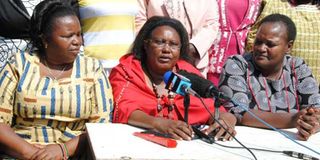How parties exploit loopholes to award cronies and relatives nomination slots

Nakuru Maendeleo ya Wanawake chairperson Keziah Ngina (centre) addresses journalists in Nakuru on Friday. The group criticised Jubilee’s list of nominees to the county assembly. PHOTO | JOHN NJOROGE | NATION MEDIA GROUP
What you need to know:
- President Uhuru Kenyatta’s cousin, Beth Mugo, was handed a nomination slot to the Senate by The National Alliance party.
- Former Bondo MP, Dr Oburu Oginga, rode on the ticket of “special interest groups” as a representative of farmers.
- Jubilee Party’s Kimani Ngunjiri claims a list of nominees to the assembly drawn by Nakuru County is made up of girlfriends and relatives of certain powerful party operatives.
- Favouritism in the handing out of nomination slots is not a new trend.
The likelihood of a stammerer clinching a nomination slot in the county and national assemblies or Senate on account of being “disabled” is just as high as that of a politician from a rural area joining Parliament as a representative of farmers – thanks to the vagueness of electoral laws.
And, although the Independent Electoral and Boundaries Commission has come up with stringent measures, including confirmation of one’s condition from the relevant institutions and associations of the disabled, human rights lawyer Brian Weke argues this measure is still open to manipulation.
“Except for the involuntary pauses and repetition in speech, a stammerer, for instance, is an able-bodied and able-minded individual who deserves no favouritism or affirmative action to participate in competitive politics.
EXPLOIT LOOPHOLES
Yet, as the Constitution stands, here is an individual who can exploit loopholes in the law for a free ticket to Parliament,” says the immediate former Chief Executive Officer of Institute for Education in Democracy.
While the Constitution uses sweeping words like “youth, minorities, special interest groups and the disabled” as among those who deserve nomination slots to county assemblies and Parliament, Mr Weke points out that the law fails to offer an apt definition of these categories of individuals.
This partly explains how, last time, many politicians aged above 40 gained entry to county assemblies and Parliament as “youths” and others like former Bondo MP, Dr Oburu Oginga, rode on the ticket of “special interest groups” as a representative of farmers.
ELDER BROTHER
Dr Oginga also happens to be the elder brother of ODM party leader Raila Odinga.
Similarly, President Uhuru Kenyatta’s cousin, Beth Mugo, was handed a nomination slot to the Senate by The National Alliance party, which has since been dissolved with the formation of the Jubilee Party.
With the nomination process looming, there are fears among politicians that these vices might be replicated this year.
Already, Jubilee Party’s Kimani Ngunjiri (Bahati MP) has raised the red flag, claiming a list of nominees to the assembly drawn by Nakuru County is made up of girlfriends and relatives of certain powerful party operatives.
UNDESERVING INDIVIDUALS
Mr Weke warns that failure by MPs in the 11th Parliament to legislate on what specifically amounts to “youth”, “minorities”, “disabled” and “interest groups”, will hand political parties an opportunity to abuse the law by nominating undeserving individuals including friends and relatives to Parliament and county assemblies.
However, party officials say they are working with the electoral commission to guarantee a free and fair process this time round.
ODM secretary-general Agnes Zani says the electoral commission has held a series of meetings with the political parties to achieve this, including directing that the nomination process be devolved to give room to counties to draw up the lists of nominees before forwarding these to their respective parties.
“I can guarantee that our final list shall be more representative, because it will take into account the law as well as regional and gender balance,” said Dr Zani.
NOMINATION SLOTS
In Jubilee, vice-chairman David Murathe said the party would give priority to women in allocating the nomination slots.
“With Parliament having failed to legislate on the two-thirds gender rule, we want to demonstrate our ability to fill the gender gap in political representation,” said Mr Murathe.
Mr Murathe said the President’s party will lead by example in nominating more women to county assemblies, National Assembly and the Senate, compared to 2013.
Favouritism in the handing out of nomination slots is not a new trend.
REWARD LOYALISTS
During their reigns, the first and second presidents, Jomo Kenyatta and Daniel arap Moi, used the slots to reward loyalists. Mulu Mutisya, for instance, was separately nominated three times by the two regimes.
Only Jubilee’s Amina Abdala, who was first nominated by Kanu (then led by the current president) in 2002, equals this record.
On a positive note, though, the nomination arrangement has over the years served as a springboard for mostly women to mature into elective politics.
Nominated in 2002, for instance, Ms Cecily Mbarire graduated to elective politics in 2007 as Runyenjes MP as did Adeline Mwau (Makueni deputy governor).
Similarly, 2007 nominees Millie Odhiambo (Suba North MP), Rachel Shebesh (Nairobi woman representative) and Maison Leshomo (Samburu woman representative), got elected in the subsequent 2013 elections.




